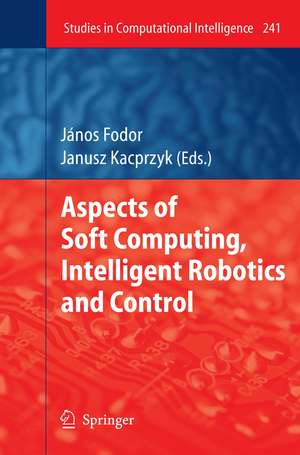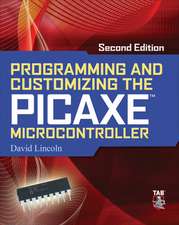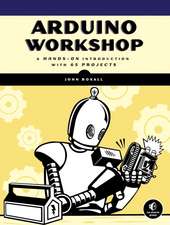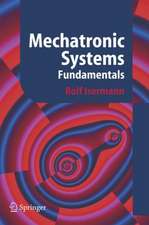Aspects of Soft Computing, Intelligent Robotics and Control: Studies in Computational Intelligence, cartea 241
Editat de János Fodoren Limba Engleză Paperback – 14 mar 2012
| Toate formatele și edițiile | Preț | Express |
|---|---|---|
| Paperback (1) | 645.14 lei 6-8 săpt. | |
| Springer Berlin, Heidelberg – 14 mar 2012 | 645.14 lei 6-8 săpt. | |
| Hardback (1) | 654.21 lei 6-8 săpt. | |
| Springer Berlin, Heidelberg – 20 aug 2009 | 654.21 lei 6-8 săpt. |
Din seria Studies in Computational Intelligence
- 20%
 Preț: 449.37 lei
Preț: 449.37 lei - 20%
 Preț: 1158.26 lei
Preț: 1158.26 lei - 20%
 Preț: 986.66 lei
Preț: 986.66 lei - 20%
 Preț: 1452.76 lei
Preț: 1452.76 lei - 20%
 Preț: 168.78 lei
Preț: 168.78 lei - 20%
 Preț: 1291.10 lei
Preț: 1291.10 lei - 18%
 Preț: 1112.30 lei
Preț: 1112.30 lei - 20%
 Preț: 565.39 lei
Preț: 565.39 lei - 20%
 Preț: 649.28 lei
Preț: 649.28 lei - 20%
 Preț: 1047.73 lei
Preț: 1047.73 lei - 20%
 Preț: 1578.96 lei
Preț: 1578.96 lei - 20%
 Preț: 643.50 lei
Preț: 643.50 lei - 20%
 Preț: 657.49 lei
Preț: 657.49 lei - 20%
 Preț: 993.28 lei
Preț: 993.28 lei - 20%
 Preț: 990.80 lei
Preț: 990.80 lei - 20%
 Preț: 989.96 lei
Preț: 989.96 lei - 20%
 Preț: 1165.69 lei
Preț: 1165.69 lei - 20%
 Preț: 1444.52 lei
Preț: 1444.52 lei - 20%
 Preț: 1041.96 lei
Preț: 1041.96 lei - 20%
 Preț: 1047.73 lei
Preț: 1047.73 lei - 20%
 Preț: 1046.06 lei
Preț: 1046.06 lei - 18%
 Preț: 2500.50 lei
Preț: 2500.50 lei - 20%
 Preț: 989.13 lei
Preț: 989.13 lei - 20%
 Preț: 1165.69 lei
Preț: 1165.69 lei - 20%
 Preț: 1164.05 lei
Preț: 1164.05 lei - 20%
 Preț: 1042.79 lei
Preț: 1042.79 lei - 20%
 Preț: 1460.19 lei
Preț: 1460.19 lei - 18%
 Preț: 1403.52 lei
Preț: 1403.52 lei - 18%
 Preț: 1124.92 lei
Preț: 1124.92 lei - 20%
 Preț: 1039.47 lei
Preț: 1039.47 lei - 20%
 Preț: 1008.11 lei
Preț: 1008.11 lei - 20%
 Preț: 1045.25 lei
Preț: 1045.25 lei - 20%
 Preț: 1275.42 lei
Preț: 1275.42 lei - 20%
 Preț: 1040.32 lei
Preț: 1040.32 lei - 20%
 Preț: 988.32 lei
Preț: 988.32 lei - 20%
 Preț: 1169.79 lei
Preț: 1169.79 lei - 20%
 Preț: 1162.37 lei
Preț: 1162.37 lei - 20%
 Preț: 1059.26 lei
Preț: 1059.26 lei - 20%
 Preț: 1164.05 lei
Preț: 1164.05 lei - 20%
 Preț: 1166.52 lei
Preț: 1166.52 lei - 20%
 Preț: 1459.38 lei
Preț: 1459.38 lei - 18%
 Preț: 1005.74 lei
Preț: 1005.74 lei - 20%
 Preț: 997.38 lei
Preț: 997.38 lei - 20%
 Preț: 1055.94 lei
Preț: 1055.94 lei - 20%
 Preț: 1284.47 lei
Preț: 1284.47 lei - 20%
 Preț: 994.08 lei
Preț: 994.08 lei - 20%
 Preț: 1048.72 lei
Preț: 1048.72 lei - 20%
 Preț: 1066.02 lei
Preț: 1066.02 lei - 20%
 Preț: 943.78 lei
Preț: 943.78 lei - 20%
 Preț: 1173.10 lei
Preț: 1173.10 lei
Preț: 645.14 lei
Preț vechi: 806.42 lei
-20% Nou
Puncte Express: 968
Preț estimativ în valută:
123.46€ • 134.06$ • 103.71£
123.46€ • 134.06$ • 103.71£
Carte tipărită la comandă
Livrare economică 22 aprilie-06 mai
Preluare comenzi: 021 569.72.76
Specificații
ISBN-13: 9783642269271
ISBN-10: 3642269273
Pagini: 288
Ilustrații: XII, 269 p.
Dimensiuni: 155 x 235 x 15 mm
Greutate: 0.41 kg
Ediția:2009
Editura: Springer Berlin, Heidelberg
Colecția Springer
Seria Studies in Computational Intelligence
Locul publicării:Berlin, Heidelberg, Germany
ISBN-10: 3642269273
Pagini: 288
Ilustrații: XII, 269 p.
Dimensiuni: 155 x 235 x 15 mm
Greutate: 0.41 kg
Ediția:2009
Editura: Springer Berlin, Heidelberg
Colecția Springer
Seria Studies in Computational Intelligence
Locul publicării:Berlin, Heidelberg, Germany
Public țintă
ResearchCuprins
Soft Computing.- Pseudo-Analysis in Soft Computing.- Aggregation Functions in Fuzzy Systems.- Neural Networks or Fuzzy Systems.- New IEC Research and Frameworks.- Intelligent Robotics.- How to Generate and Realize Bipedal Gait in Unstructured Environments?.- PDAC-Based Brachiating Control of the Multi-Locomotion Robot.- A Simple Method for Generating Smooth Robot Arm Motion.- Fuzzy Inference-Based Mentality Expression for Eye Robot in Affinity Pleasure-Arousal Space.- Fuzzy Communication and Motion Control by Fuzzy Signatures in Intelligent Mobile Robots.- Intelligent Control.- Linear Switching Systems: Attainability and Controllability.- Indirect Adaptive Control Using Hopfield-Based Dynamic Neural Network for SISO Nonlinear Systems.- Fuzzy Immune Controller Synthesis for ABR Traffic Control in High-Speed Networks.- Takagi-Sugeno Type Fuzzy Automaton Model.- Control and Dynamics of Fractional Order Systems.- Adaptive Control Using Fixed Point Transformations for Nonlinear Integer and Fractional Order Dynamic Systems.
Textul de pe ultima copertă
Soft computing, as a collection of techniques exploiting approximation and tolerance for imprecision and uncertainty in traditionally intractable problems, has become very effective and popular especially because of the synergy derived from its components. The integration of constituent technologies provides complementary methods that allow developing flexible computing tools and solving complex problems. A wide area of natural applications of soft computing techniques consists of the control of dynamic systems, including robots. Loosely speaking, control can be understood as driving a process to attain a desired goal. Intelligent control can be seen as an extension of this concept, to include autonomous human-like interactions of a machine with the environment. Intelligent robots can be characterized by the ability to operate in an uncertain, changing environment with the help of appropriate sensing. They have the power to autonomously plan and execute motion sequences to achieve a goal specified by a human user without detailed instructions. In this volume leading specialists address various theoretical and practical aspects in soft computing, intelligent robotics and control. The problems discussed are taken from fuzzy systems, neural networks, interactive evolutionary computation, intelligent mobile robotics, and intelligent control of linear and nonlinear dynamic systems.
Caracteristici
State of the art of Soft Computing, Intelligent Robotics and Control












